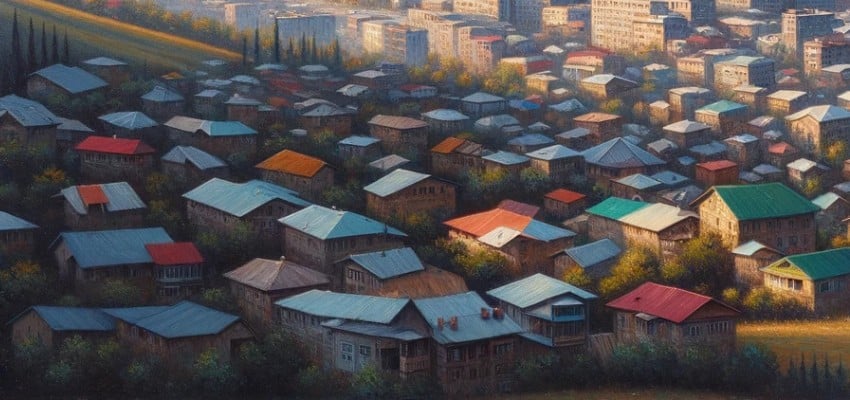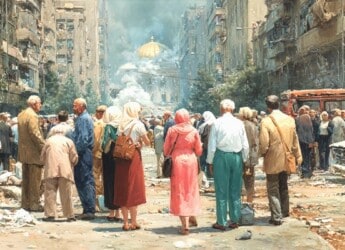|
|
Content Assessment: Fault Lines Exposed as Russia Reels Socially and Militarily (October 24-30, 2023)
Information
Insight
Relevance
Objectivity
Authority
Excellent
A short assessment of the qualitative benefit of the recent synthesis of reporting from the Institute for the Study of War on the Russo-Ukrainian War from October 24-30, 2023.
Editor’s Note: Simmering divides within Russian society boiled over this week as widespread antisemitic protests erupted in Dagestan. The unrest underscores the Kremlin’s failure to restrain dangerous ethno-nationalist radicalization, despite blaming foreign actors. Managing these tensions amid an unsuccessful war is a growing challenge.
Meanwhile, Ukraine notched incremental gains near Bakhmut and in southern oblasts, sustaining its grinding offensive. But heavy Russian losses around Avdiivka reveal equipment shortfalls and degraded capabilities for mechanized warfare for Russia, even as it adapts militarily.
Russia continues to rely on unprepared convicts as cannon fodder, leading to heavy casualties. And strikes on Russian military assets in Crimea proceed unchecked.
As winter nears, the strains of war are increasingly evident in Russia’s fracturing social fabric and lackluster military performance. But Ukraine also faces hurdles sustaining its slow offensive and securing sufficient Western aid. Both sides are being tested, but Russia’s struggles appear more existential.
Source Note: One of the most accurate and detailed sources for ongoing updates on the Ukraine crisis is the Russian Offensive Campaign Assessment from the Institute for the Study of War. The Institute for the Study of War (ISW) is a 501(c)(3) organization and produces strictly non-partisan, non-ideological, fact-based research. ISW seeks to promote an informed understanding of war and military affairs through comprehensive, independent, and accessible open-source research and analysis. ISW’s research is made available to the general public, military practitioners, policymakers, and media members. Providing a daily synthesis of key events related to the Russian aggression against Ukraine, ISW updates may benefit investigators and litigators as they follow the business, information technology, and legal trends and trajectories impacted by and stemming from the current Russo-Ukrainian conflict.
For those seeking to grasp the full scope of this evolving landscape, the complete updates from the Institute for the Study of War serve as an invaluable resource.
Assessments and Maps*
Russo-Ukrainian Conflict Assessments
- Institute for the Study of War (ISW), Russia Team
- Critical Threats Project (CTP), American Enterprise Institute
General Assessment Background Info
- ISW systematically publishes Russian campaign assessments, including maps highlighting the assessed control of terrain in Ukraine and main Russian maneuver axes.
- Maps augment daily synthetic products that cover key events related to the Russian aggression against Ukraine.
The Russian Offensive Campaign Assessments
Overall Summary
The following narrative report summarizes key events and themes from daily campaign assessments of the Russia-Ukraine war by experts at the Institute for the Study of War during the period of October 24-30. It combines daily details into one chronological account of critical developments in the ongoing crisis. The daily assessments draw on public reports and expertise from Institute for the Study of War (ISW) analysts.
October 30: Russia Suppresses Antisemitic Riots, Blames Ukraine as Ethnic Tensions Rise
Russian authorities claimed to have suppressed the antisemitic riots that occurred in Makhachkala, Dagestan on October 29. The Interior Ministry said over 150 rioters were identified and 60 detained after trying to storm the airport and attack passengers of a flight from Israel.
Vladimir Putin responded by accusing Ukraine of trying to instigate pogroms in Russia under Western guidance. He claimed the riots were inspired through social media from Ukraine. However, Kremlin officials largely avoided condemning the rioters directly.
Some Russian officials did directly criticize regional authorities for ignoring growing antisemitism. But most focused on blaming foreign actors, deflecting from domestic radicalization. Analysts say the war’s hyper-nationalism is empowering dangerous ideologies, especially among ethnic minorities.
Meanwhile, Russian soldiers reportedly murdered a Ukrainian family in occupied Volnovakha, Donetsk. Ukraine’s human rights ombudsman suggested Chechen units killed the nine civilians for refusing to shelter them.
Russian sources exploited the accusation to claim Ukraine wants to increase tensions between ethnic groups in Russia. Their concern about interethnic relations in the military indicates serious worries about radicalization.
On the warfront, Ukraine continued offensives near Bakhmut and in western Zaporizhia. Russia is using convict recruits in repeated frontal assaults lacking artillery support. Analysts say the poorly trained “Storm-Z” units suffer high casualties.
In military cooperation, Defense Minister Sergei Shoigu touted strong China-Russia ties at a Beijing forum, while focusing on alleged Western threats. But China likely has reservations about Russia’s desired “no limits” partnership.
Meanwhile, Russia conducted strikes across Ukraine using missiles, drones, and new guided bombs. Ukraine says its air defenses intercepted drones and missiles, but infrastructure damage occurred. The use of smart bombs shows Russia is still innovating militarily despite setbacks.
October 29: Antisemitic Protests in Dagestan Highlight Ethnic Tensions in Russia
Widespread antisemitic protests recently occurred in the Republic of Dagestan and elsewhere in Russia’s North Caucasus region. The demonstrations highlighted growing interethnic and religious tensions in the country.
The protests started after rumors circulated that Russian authorities planned to resettle Israeli refugees in Dagestan. Hundreds gathered at a hotel in Khasavyurt searching for the supposed refugees. A Jewish cultural center in Kabardino-Balkaria was also set on fire.
The rumors originated on a Telegram channel that called for protests at the Makhachkala airport against a flight arriving from Israel. Hundreds blocked the runway and attempted to search passengers for Israeli citizens, chanting anti-Jewish slogans. Police eventually removed the protesters.
The Kremlin has remained largely silent, leaving regional leaders to condemn the aggression and ethnic hatred. However, the protests worried many, including Russia’s chief rabbi in Dagestan who said Jewish families should leave the country.
The unrest comes as Vladimir Putin promotes Russia as a place of religious tolerance. But ultranationalists fear the protests could spread anti-Semitism and violence elsewhere in Russia. Officials also seem unable to stem interethnic clashes involving migrants and nationalists.
Some think intelligence heads Alexander Bortnikov and Alexander Bastrykin are using the tensions to regain Putin’s favor after failing to properly integrate migrants. The Kremlin often ignores such issues, fueling further unrest.
In military news, the commander of Russian forces in Kherson may have been dismissed after Ukrainian gains on the Dnipro River’s east bank. Analysts say he failed to stop the Ukrainian raids. His replacement indicates worries about defending Kherson as Ukraine continues offensives there and in western Zaporizhia.
Additionally, the US plans to provide Ukraine with FrankenSAM air defense systems this fall. FrankenSAMs combine advanced Western missiles with modified Soviet launchers Ukraine already has. This allows Ukraine to integrate new missiles into existing air defense networks quickly. The makeshift systems help fill critical gaps as Russia continues missile and drone attacks.
October 28: Ex-Wagner Fighters Integrate into Russian Military in Ukraine
Remnants of the Wagner Group private military company appear to be fighting in Ukraine under Russian Ministry of Defense formations, rather than as an independent entity.
An interview with a Russian battalion commander indicated Wagner personnel compose part of his unit near Avdiivka. The battalion is part of larger Russian military structures in the area. Wagner operators provide specialized skills to various frontline sectors as needed.
This suggests former Wagner fighters signed Russian military contracts after the group’s fragmentation. Wagner likely lacks the cohesion it had under unitary leadership. But its veterans may provide tactical advantages for embedded units.
Meanwhile, a Chechen commander confirmed many ex-Wagner soldiers are joining Chechen “Akhmat” Spetsnaz groups under the Russian National Guard. The Chechen commander claimed the shift is occurring smoothly.
Analysts say the dispersal of ex-Wagner forces in this manner will prevent their reemergence as a cohesive entity. But it provides reinforcements across Russian formations.
In Ukraine’s counteroffensive, Ukrainian troops continued operations near Bakhmut and in western Zaporizhia. Russia conducted missile strikes across southern Ukraine, some intercepted by air defenses.
Russia is also using new autonomous “Lancet” drones that can independently identify targets. While not yet widespread, swarming these drones could help Russia overwhelm air defenses. But their small payloads may limit damage.
The military developments come as Russia increases public coercion of Central Asian migrants into service to appeal to nationalists. But stoking ethnic tensions could further destabilize society.
October 27: Ukraine Makes Marginal Gains in Kherson Amid Ongoing Offensives
Ukrainian forces made minor advances on the east bank of the Dnipro River in Kherson Oblast according to geolocated footage. Ukraine’s military continued offensive operations around Bakhmut and western Zaporizhia as well.
The ground maneuvers come as Russia conducted widespread missile and drone strikes overnight across Ukraine. Ukraine says over 500 Iranian-made Shahed drones targeted critical infrastructure last month alone.
Germany and Denmark also announced major new military aid packages for Ukraine valued at billions of dollars. The assistance includes tanks, armored vehicles, anti-aircraft missiles and drones.
In occupied areas, there was an assassination attempt against former Ukrainian separatist politician Oleg Tsaryov in Crimea. Russian authorities opened an investigation but released few details.
Meanwhile, Russia apparently arrested citizens running Telegram channels that extorted officials by threatening to leak compromising info. Some impacted channels claim to be insider sources on the war.
Finally, Russia seems to be coercing captured Ukrainian POWs to join a “volunteer” battalion to fight fellow Ukrainians. Forcing prisoners of war into combat would violate the Geneva Conventions.
The formation of pro-Russian battalions from Ukrainian POWs indicates Russia is still struggling with recruitment and troop losses despite annexing occupied territory. Prisoners also face unsafe conditions.
October 26: Heavy Losses Around Avdiivka May Undermine Russia’s Capabilities
Ukraine says Russia has suffered 5,000 casualties and lost 400 armored vehicles around Avdiivka since October 10. Satellite imagery confirms significant vehicle losses.
Analysts say the equipment shortfall will likely degrade Russia’s mechanized maneuver capabilities long-term. Previous heavy losses around Vuhledar constrained Russia’s 2023 offensives elsewhere.
Despite some defense industry mobilization, Russia has struggled to replace cumulative equipment losses. More losses around Avdiivka will further exacerbate shortages.
In ground fighting, Ukraine made marginal gains north of Kherson City. Ukrainian forces also continued operations near Bakhmut and in western Zaporizhia.
Ukraine denied reports it suspended the Black Sea grain export corridor. Russia aims to disrupt the exports and shipping. New Russian citizenship rules also now allow revoking naturalized migrants’ status, likely to increase military recruitment coercion.
The developments come as the EU reportedly lags on artillery ammunition deliveries to Ukraine. The US and UK just announced new military aid packages for Ukraine valued at over $270 million combined.
Finally, a senior Hamas delegation visited Moscow and met Russian and Iranian officials. Russia is exploiting the Israel-Hamas war for propaganda as it tries to mediate.
October 25: Ukraine Makes Marginal Gains in Western Zaporizhia Amid Ongoing Offensives
Ukraine continued ground maneuvers, achieving minor advances west of Robotyne in western Zaporizhia according to geolocated footage. Ukrainian forces also conducted operations near Bakhmut.
The limited gains come as Ukraine braces for intensified Russian strikes this fall and winter against energy infrastructure. Russia launched more drone attacks overnight that Ukraine says it intercepted.
In response, Ukraine is planning its own strikes against Russian military assets in Crimea and mainland Russia. Ukraine says Russia is repositioning Black Sea naval forces and aircraft in anticipation.
Meanwhile, Russia’s defense minister visited frontline forces in Donetsk after awarding medals to naval infantry units. Moscow also confirmed the appointment of a new commander for its Eastern Grouping of Forces.
However, Chechen leader Ramzan Kadyrov is facing blowback in Russia for supporting his son’s violent actions and creating a pro-Ukraine volunteer battalion named after a historical Chechen resistance fighter.
Kadyrov risks angering Russian nationalists as he tries to balance Kremlin orthodoxy and Chechen Islam. His messaging indicates the challenges of Russia’s internal religious and ethnic dynamics amid the war.
October 24: Ukraine Advances South of Bakhmut, West of Zaporizhia Amid Offensives
Ukrainian forces made confirmed advances south of Bakhmut and in western Zaporizhia Oblast according to geolocated footage on October 23-24. This comes amid Ukraine’s ongoing counteroffensive operations.
The ground gains follow Russia’s increased use of cheaper, lighter drones alongside Shaheds to strike Ukrainian infrastructure. The new drones are harder to detect but deliver lighter payloads.
Russia is also expanding coercion efforts targeting Central Asian migrants, reopening old criminal cases to spur military recruitment. Officials ordered media to highlight “ethnic crime.”
Meanwhile, Ukraine’s president said Russia’s Black Sea Fleet is fleeing Crimea due to Ukraine’s strike campaign. He said Russia’s regional dominance is fading as Ukraine launches new trade routes.
The developments highlight Russia’s continued military adaptation but also weakness as Ukraine makes gradual advances and targets vulnerabilities in Russia’s war effort and regional posture.
Themes and Dynamics
The past week saw growing ethnic and religious tensions within Russian society come to the fore, highlighted by widespread antisemitic protests and riots in Dagestan. This unrest stems from the war’s hyper-nationalist ideologies empowering dangerous radical views, especially among ethnic minority groups. The Kremlin denied any domestic radicalization and blamed foreign actors, but its inability to integrate migrants and curb interethnic conflicts continues to fuel tensions.
Ukraine continued its grinding offensives around Bakhmut and made marginal gains in western Zaporizhia and Kherson oblasts. However, heavy equipment losses for Russia around Avdiivka could degrade its mechanized capabilities long-term, constraining future offensives. Russia is adapting militarily, using new drones and missiles, but it continues to rely on poorly trained convict recruits suffering high casualties.
Overall, the week shows the stresses the protracted war is placing on Russian society, while Ukraine sustains its slow battlefield advances. Russia’s ethnic and religious fault lines are increasingly exposed even as it tries cosmetic military adaptations. Ukraine appears set to continue leveraging Russian weaknesses through strikes on Crimea and the Black Sea Fleet.
We do not report in detail on Russian war crimes because those activities are well-covered in Western media and do not directly affect the military operations we are assessing and forecasting. We will continue to evaluate and report on the effects of these criminal activities on the Ukrainian military and population and specifically on combat in Ukrainian urban areas. We utterly condemn these Russian violations of the laws of armed conflict, Geneva Conventions, and humanity even though we do not describe them in these reports.
Detailed Reporting with Maps for October 24 – 30, 2023, from the ISW – Mouseover to Scroll
Russian Offensive Campaign Assessment, October 24-30 2023Review the Detailed Reporting and Maps PDF
See the Institute for the Study of War Interactive Map of the Russian Invasion
Read the latest Ukraine Conflict updates from the Institute for the Study of War
* Shared with direct express permission from the Institute for the Study of War (ISW).
About the Institute for the Study of War Research Methodology
ISW’s research methodology relies on both primary and secondary sources, enabling researchers to develop a comprehensive understanding of the situation on the ground. In order to analyze military and political developments in any given area, ISW’s research analysts must wholly understand the systems of enemy and friendly forces. They must also understand the population demographics, physical terrain, politics, and history of that area. This lays the analytical foundation for understanding the reasons for particular developments and fulfilling their assigned research objectives. ISW analysts also spend time in places like Iraq, Afghanistan, and elsewhere in order to gain a better understanding of the security and political situation and to evaluate the implementation of current strategies and policies. Our researchers compile data and analyze trends, producing a granular analysis of developments in areas of research, producing an accurate, high-resolution, timely, and thorough picture of the situation. ISW’s research methodology guarantees its success and commitment to improving the nation’s ability to execute military operations, achieve strategic objectives, and respond to emerging problems that may require the use of American military power.
About the Institute for the Study of War
The Institute for the Study of War advances an informed understanding of military affairs through reliable research, trusted analysis, and innovative education. We are committed to improving the nation’s ability to execute military operations and respond to emerging threats in order to achieve U.S. strategic objectives. ISW is a non-partisan, non-profit, public policy research organization.
Learn more, get involved, and contribute today.
Additional Reading
- From Dissent to OSINT? Understanding, Influencing, and Protecting Roles, Reputation, and Revenue
- [Annual Update] International Cyber Law in Practice: Interactive Toolkit
- Data Embassies: Sovereignty, Security, and Continuity for Nation-States
Assisted by GAI and LLM Technologies
Source: ComplexDiscovery









































